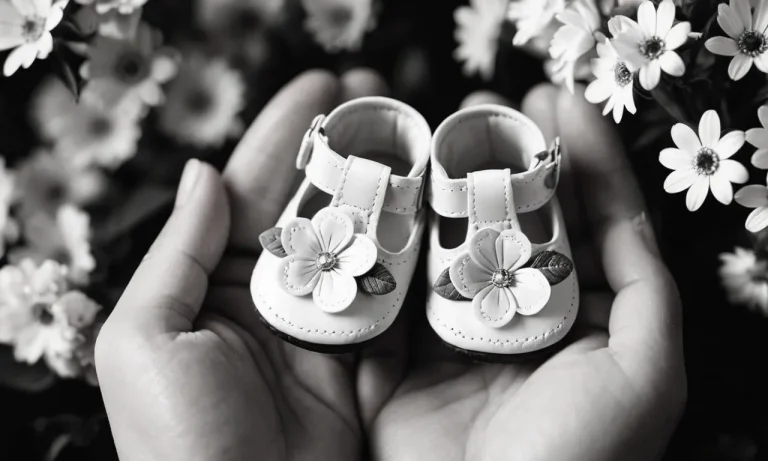What Does The Bible Say About Femininity?
In today’s world, there are many conflicting messages about what it means to be a woman. From unrealistic beauty standards to gender stereotypes, it can be confusing to know how to embrace God-given femininity.
If you’re short on time, here’s a quick answer to your question: The Bible presents a balanced view of femininity that affirms the equal value and dignity of men and women while also recognizing their differences and unique roles.
Key principles from Scripture include nurturing life, exhibiting gentle strength, embracing beauty and modesty, cultivating wisdom and discernment, and living out complementary partnerships between men and women.
In this comprehensive article, we will explore principles and examples from Scripture that paint a holistic, refreshing picture of biblical femininity.
Nurturing and Sustaining Life
Childbearing and motherhood
The Bible speaks positively about childbearing and motherhood as part of God’s plan for women. Genesis 1:28 says that God blessed the first man and woman and told them to “be fruitful and multiply.” Children are seen as gifts from the Lord (Psalm 127:3-5).
Mary’s pregnancy and giving birth to Jesus is presented as something good and part of God’s plan of salvation (Luke 1-2). The Bible commends the faithfulness of biblical women like Sarah, Rebekah, Rachel, and Hannah who longed to conceive and bear children.
Motherhood is portrayed as an important and honorable role for women in the Bible. Paul speaks appreciatively of his spiritual “mother” Eunice who raised him in the faith (2 Timothy 1:5). Wise women in Proverbs are depicted teaching their children and managing their households (Proverbs 31:10-31).
God describes himself as a loving mother who will not forget or neglect her child (Isaiah 49:15). Jesus upholds the dignity of motherhood by insisting that adult children respect and care for their parents (Mark 7:9-13).
Caring for others
The Bible encourages women to use their gifts and abilities in the service of others, especially the poor and vulnerable. The “excellent wife” in Proverbs 31 is commended for her care for the needy (Prov 31:20).
Older women are urged to teach what is good and train younger women to love their husbands and children (Titus 2:3-5). The hospitable woman Phoebe is called a benefactor of Paul and others (Romans 16:1-2).
Martha is gently corrected for being too busy with household tasks, implying women ought to make time for spiritual growth and ministry as well (Luke 10:38-42).
Various biblical women modeled caring for others in need – Ruth gleaned in the fields to provide for her destitute mother-in-law (Ruth 2), the widow of Zarephath shared her last bit of food with the prophet Elijah (1 Kings 17:8-24), the prophetess Anna spoke of Jesus to those looking for redemption in Jerusalem (Luke 2:36-38).
Jesus affirmed Mary’s priority to sit and learn from him rather than fulfill traditional female roles like serving guests (Luke 10:38-42). Godly women are called to follow such examples and think of the needs of others before their own (Philippians 2:4).
Exhibiting Gentle Strength
Inner strength and dignity
The Bible encourages women to develop inner strength and dignity that comes from a gentle and quiet spirit (1 Peter 3:4). This type of strength is not loud or forceful but exhibits poise, self-control, and sound judgment.
Women with inner strength know their worth comes from God, not people or possessions. They have conviction in their beliefs but speak the truth in love (Ephesians 4:15). A woman who walks in this gentle strength inspires confidence in others and doesn’t need to seek the approval of others.
Appropriate influence
While some view women as weak or passive, the Bible shows that godly women can have tremendous influence. Scripture urges older women to train younger women in sound doctrine and righteous living (Titus 2:3-5). This appropriate influence helps set the tone for families, churches, and society.
Women also influence future generations by pouring into their children spiritually. Scripture celebrates godly mothers like Eunice and Lois who passed down sincere faith to their sons and grandsons (2 Timothy 1:5).
Great women of the Bible like Sarah, Hannah, Elizabeth, and Mary trusted in God and gave birth to children who left an imprint on history.
The woman described in Proverbs 31 exhibits gentle strength in managing her household, caring for the poor, overseeing side enterprises, and supporting her husband. Her competence, wisdom, and vision enhance her husband’s influence in the community.
Women with inner strength and dignity can have tremendous godly influence without domineering over others. Their lives exhibit the gentle strength that comes from walking closely with God.
Embracing Beauty and Modesty
Outward adornment
The Bible encourages women to focus on inner beauty rather than relying solely on outward appearance. 1 Peter 3:3-4 states, “Do not let your adorning be external—the braiding of hair and the putting on of gold jewelry, or the clothing you wear— but let your adorning be the hidden person of the heart with the imperishable beauty of a gentle and quiet spirit, which in God’s sight is very precious.”
Rather than overly concerning themselves with hairstyles, jewelry, and fashion, God desires women to cultivate attractiveness through development of their inner spirit.
While Scripture does not forbid women from caring for their physical appearance, it warns against vanity, immodesty, and reliance on outward beauty as the source of self-worth. 1 Timothy 2:9-10 provides instructions for appropriate adornment: “Women should adorn themselves in respectable apparel, with modesty and self-control, not with braided hair and gold or pearls or costly attire, but with what is proper for women who profess godliness—with good works.”
Here the emphasis is on modesty, self-control, and good works rather than trendy hair and clothing styles.
Inner adornment
The Bible praises development of inner beauty in a gentle and quiet spirit as precious to God (1 Peter 3:4). Rather than thinking highly of herself, a woman should cultivate humility, modesty, and a forgiving spirit (Philippians 2:3-4, Ephesians 4:2).
She should pursue moral purity and fidelity in marriage (Proverbs 31:10, 1 Timothy 3:11). Most importantly, she should grow in love for God and others (Matthew 22:37-39).
Scripture commends wise and kind speech, diligent work ethic, provision for family, and care for the poor as indicators of true beauty rooted in godly character (Proverbs 31:10-31). While external attractiveness fades, unfading beauty comes from a heart reflecting the love and grace of Jesus Christ.
As 2 Corinthians 3:18 states, “And we all, with unveiled face, beholding the glory of the Lord, are being transformed into the same image from one degree of glory to another.” By gazing upon Christ, women radiate His glory and beauty.
Cultivating Wisdom and Discernment
Seeking godly counsel
Seeking wisdom from God through prayer and reading the Bible is crucial, as the fear of the Lord is the beginning of wisdom (Proverbs 9:10). Additionally, godly counsel from mature Christian women can provide great insight and discernment.
Some fantastic ways to find mentors include getting involved at church, joining a Bible study group, or reaching out to older women in your family or community.
Websites like Proverbs 31 Ministries and Women’s Ministry also have tons of resources for connecting with other believers. Their content on Biblical womanhood provides sound wisdom for cultivating discernment in relationships, purity, managing emotions, parenting, and walking closely with God.
Making sound judgments
Rather than relying on our limited human logic, God calls us to seek heavenly wisdom when making decisions (James 1:5). Regularly praying and studying the Bible helps transform our minds to discern God’s will (Romans 12:2).
We must also be careful to ignore ungodly advice from culture and media pushing conformance to worldly standards.
Wisdom comes from God and is “first of all pure, then peace-loving, considerate, submissive, full of mercy and good fruit, impartial and sincere” (James 3:17). Applying these principles when evaluating situations helps us exercise righteousness judgment aligned with Biblical truth rather than emotions or external pressure.
Consulting with spiritually mature Christians also provides valuable outside perspective.
As Proverbs 11:14 states, “For lack of guidance a nation falls, but victory is won through many advisers.” Making big decisions without godly counsel is unwise and can lead us astray. Therefore, developing relationships with mature believers who can offer wisdom and accountability helps steer our lives in alignment with Christ’s will.
Complementary Partnerships
Husband and wife
The Bible teaches that husbands and wives are designed to complement each other in a marriage relationship. God created men and women equal in value and dignity, yet with differences so they can fulfill distinct roles and responsibilities (Genesis 1:27).
Wives are called to submit to their husbands, not as a demeaning role, but as an act of faith and obedience to Christ (Ephesians 5:22-24). Husbands are commanded to love their wives sacrificially, just as Christ loved the church (Ephesians 5:25).
This mutual submission reflects the complementary partnership between husband and wife that honors God.
According to the Bible, marriage roles are not assigned arbitrarily. The distinctions between husband and wife reflect God’s created design and order. God did not create men and women exactly the same but rather distinctly, with the intention that their differences would complement each other.
Men and women are both created in God’s image and are equal in value and dignity, but they have distinct roles and responsibilities in marriage. When each spouse humbly submits to God’s design, the marriage thrives in beauty.
Men and women in church leadership
The Bible teaches that men and women are spiritually equal in God’s kingdom with equal access to God’s gifts and blessings (Galatians 3:28). However, it also teaches gender-based distinctions in the roles and responsibilities designated for church leadership.
The apostle Paul instructed that women should remain silent in church and not assume teaching authority over men (1 Timothy 2:12). This is not because women are less competent, intelligent, or able, but because God has created men and women differently by divine design.
According to the complementarian view, God has ordained that only qualified men are to serve in positions of authority and teaching in the church (1 Timothy 3:1-7). Women do have an important role in the church but are not permitted to serve as pastors or elders.
Those who hold this view believe it reflects God’s ideal design and order for male headship in the church family, just as within the family unit (Ephesians 5:22-33). However, both men and women are gifted for service in God’s kingdom and empowered by the Holy Spirit (Acts 2:17-18).
Conclusion
In a world filled with distortions, the Bible provides refreshing clarity on God’s design for femininity. By embracing our calling as life-givers, cultivating gentle strength, beautifying ourselves modestly, developing discernment through wisdom, and thriving in complementary partnerships, we can walk confidently in biblical womanhood.
Our truest feminine identity is found in reflecting the nature of Jesus Christ through nurturing, strong, beautiful, wise, and collaborative living. May we reject false stereotypes and fully embrace this high calling, to the flourishing of ourselves, our relationships, and the purpose of God in our feminine design.







